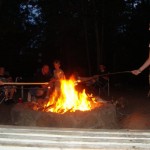Sharing life with one another and sharing life with Christ
In many blog posts, I write about sharing life with one another. In fact, my previous post was called “It’s about life in Christ, not ideologies about Christ.” In that post, I said that many problems arise because we disagree and argue without actually sharing our lives with one another.
If the authors of Scripture are right (and I think they are), then God did not give us new life in Jesus Christ in order for us to spend that life alone. Instead, our new life in Christ is to be shared with others in both big ways and in small ways. In fact, for those of us who are in Christ and indwelled by the Holy Spirit, then we share Christ with others when we share our lives with them.
John makes an interesting statement at the beginning of his first letter. After making several statements about his personal interactions with Jesus Christ, he says,
[T]hat which we have seen and heard we proclaim also to you, so that you too may have fellowship with us; and indeed our fellowship is with the Father and with his Son Jesus Christ. (1 John 1:3 ESV)
There are two points that I want to bring up here. First, the word “fellowship” has several different meanings today. But, at the time that John used it, it was based on the word for “sharing” or “having in common.” So, John was saying that announcing what he had seen, heard, felt, etc. so that they could all share their lives with one another in a way that was not possible when they were not all God’s children.
Second, notice that the fellowship (sharing) that John desires with his readers is not ONLY sharing life with them but it is also sharing life with our Father and with Jesus Christ. When we have this kind of fellowship (sharing life) with one another, it is the same as the fellowship that we have with God. Yes, that sounds crazy, but that’s exactly what John wrote.
Let me say that one more time: as we share our lives with one another we are also sharing our lives with God.
But, what happens when we refuse to share our lives with one another? If John is correct (and, again, I think he is), then we are also refusing to share our lives with God. We are refusing fellowship with our Father and with Jesus Christ.
Now, I’m not talking about attending certain meetings or going to a certain location or joining a certain organization. I’m talking about actually sharing our lives with people. Which people? The people that God brings into our lives.
To be honest, Christians are usually less concerned with fellowship with those who are already in their lives and more concerned with fellowship with people who live across town (or perhaps in another town). I think it’s great to share our lives with people all over town, but not in a way that neglects the people who live near us, who work with us, who go to school with us, who God has placed right in our lives.
Fellowship with them is fellowship with the Father and with his Son Jesus Christ… to paraphrase John.
It’s about life in Christ, not ideologies about Christ
I often write about different concepts and ideas related to being in Christ and part of the body of Christ, that is, the church. However, being in Christ is not about concepts and ideas. Being in Christ is about living.
When I first started this blog, I wrote about things that I was investigating in my PhD studies. However, I soon realized that I could not discuss ideas on a purely conceptual basis. So, almost everything that I write hear began with a real-life conversation or a real-life struggle or problem.
I was reminded of this last week when I had coffee with a good friend. We talked about the series that I wrote last week on the topic of unity. (See the introductory post called “Unity: The Series.”)
We quickly moved from discussing the concepts related to unity to talking about real life situations related to unity among the body of Christ. Then, our discussion moved from focusing on unity to focusing on our life in Christ in general. We talked about some of our recent struggles and some recent areas of growth and encouragement.
My friend made an observation: it is easier to live in unity if we actually share our lives with one another. Disunity pops up when we argue and disagree about concepts and ideologies, but we don’t share our lives with one another. My friend and I have seen this in our own lives, because we are able to live in unity with one another in Christ in spite of our differences.
His observation also reminded me of something my family experienced a couple of weeks ago when we spent a week in Virginia serving some people in the Norfolk area with other believers. We spent the week working together, not talking about issues of disagreement. And, there were disagreements – the kind of disagreements that have often caused followers of Jesus Christ to separate from one another. But, there was also real unity, in spite of those disagreements.
Our life in Christ is just that: life. It’s not simply concepts or ideologies about Christ. Instead, as John said in his first letter, it’s about sharing our lives with one another (fellowship) which is also sharing our lives with God the Father and with his son Jesus Christ. (1 John 1:3)
Perhaps, our struggles with unity would not be as difficult if we truly shared our lives with one another instead of spending as much time discussing issues, topics of theology, concepts, or other ideologies.
What do you think?
Trust and love… now what? Fellowship and discipleship…
In my last two posts, I’ve written about trusting God (“Show me your faith apart from your works“) and the primary response of that trust, which is love (“That God kind of love“). Trusting God results in loving God and loving others. When we love God and love others, that love will be demonstrated in our lives.
How is it demonstrated? In Scripture, two terms are used as umbrella terms to describe the “now what”: fellowship and discipleship. Not only are these two a direct response to trusting God and love, they are also related to one another.
The first term – fellowship – describes the connection that we have with one another through Jesus Christ. We do not have to build that connection; it is already built for us when the Holy Spirit indwells us – that is, when we are saved by Jesus Christ. Immediately, we are connected with one another because of our mutual connection to God our Father through Jesus Christ by the Holy Spirit.
Thus, we can understand why the authors of Scripture would choose a word like “fellowship” to describe this connection. At its foundation, the word “fellowship” points to “sharing.” In this case, what we share is ourselves and our lives. We become part of one anothers’ lives (become “members together with one another”) as we share in the life of God in us.
Now, it’s interesting to talk about the spiritual fellowship and connection that we have with believers all around the world. But, the authors of Scripture primarily talked about real, visible, relational fellowship, the kind of sharing and connection that takes place between people who actually live near one another. We cannot choose who we are connected to – we are connected with everyone who is in Christ. And, as long as we do not hinder the work of the Holy Spirit in us, and as long as we submit to his leading, we will find ourselves sharing our lives with all of God’s children that he brings into our life.
This sharing of life – or fellowship – leads directly into “discipleship.” It’s common today to think of “discipleship” as some type of program or class. That’s not what I’m talking about. The foundation of “discipleship” is the idea of being a disciple or “following.” In this case, “discipleship” is about helping one another submit to lordship of Jesus Christ and follow him and his direction in our lives.
Because of our fellowship, we will desire to see one another mature in Jesus Christ and live more and more in a manner worth of the gospel of Jesus Christ. God can and will work through us to help one another follow the will of God in our lives. Helping one another walk in obedience to Jesus Christ is what discipleship is all about.
So, we trust God, which is demonstrated in our lives. That faith is primarily demonstrated by an increase in love for God and for others, especially those who could be deemed “unlovable.” The Holy Spirit knits our lives together, and we share our lives with one another. Through sharing or lives with one another, God works through us to help one another follow Jesus Christ.
Replay: Autonomous Churches?
Five years ago, I wrote a post called “Autonomous churches.” It was a follow-up to a post called “Autonomous individuals.” In Christ, we are not autonomous, either as individuals or as groups of believers. Instead, we are intimately and intricately connected to one another by the Holy Spirit that indwells us. Unfortunately, today, it seems that many specialize in separate and distinguish between followers of Jesus instead of maintaining the unity of the Holy Spirit.
———————————
Autonomous churches
In my last post, “Autonomous individuals…“, I began discussing a book by Abraham J. Malherbe called Social Aspects of Early Christianity (Baton Rouge: Lousiana State University Press, 1977), specifically his chapter called “House Churches and Their Problems”. In my last post I discussed how the early Christians saw themselves as part of an extended household – a family. But, how did these early Christian “households” relate to other Christian “households”?
Malherbe continues:
As the church grew in a particular locality, more than one house church would be formed. The scarcity of information on the house churches in the first century precludes our having a clear understanding of their interrelationship. Paul seems to have known of at least three such churches in Rome (Rom. 16:5, 14, 15), and there may have been more than one group in Thessalonica (1 Thess. 5:17) and also in Laodicea (Col. 4:15). Although they may have formed separate communities, such groups were not viewed as being separate churches. Luke’s description of the church in Jerusalem is not clear on this point, but it does convey the impression that he thought of it as one church despite the smaller groups that composed it. This is supported by his (and the Pastoral Epistles) relating presbyters, or bishops, to cities rather than to individual groups (Acts 14:23; 20:17; Titus 1:5). By that time, however, more than one house church would presumably have existed in most localities with which the literature is concerned. More significant is that Paul and his followers, although they knew of separate groups in an area, wrote one letter to the church in that immediate area, apparently on the assumption that it would suffice for all the groups (e.g., Romans). On this understanding, the individual house churches would together have represented the church in any one area. [70]
Malherbe recognizes, as Scripture indicates, that there were different groups of Christians in a particular area (city). But, these groups did not consider themselves separate or distinct from other groups in the area. Instead, they considered themselves to be part of the same church. Also, Paul and others outside a particular city recognized all of the believers – and all of the groups of believers – in that city to be part of the same church.
As God formed the believers into households, He did not form them into exclusive households. Just as individuals now recognized that they were part of something bigger than themselves, the individual groups of believers also recognized that they were part of something bigger than that group. Thus, it seems from Scripture, that the distinct groups in a location – while recognized by themselves and others as a church – did not see themselves as truly distinct from other groups of believers in that same location. In fact, they also recognized a connection – though perhaps a looser connection – with other groups of believers in more distant locations. For this reason, Paul could label each group of believers meeting in a home as a church, but he could at the same time label all of the believers in a city as a church.
An autonomous church did not exist in the early days of Christianity. In fact, Paul reminds the believers in Corinth of this several times in his first letter to them. In 1 Cor. 1:2, he reminds his readers that they are not alone, but “together with all those who in every place call upon the name of our Lord Jesus Christ”. (ESV) Similarly, Paul reminds them that all the churches share common beliefs, activities, and teachings (4:17; 7:17; 11:16; 14:34; 16:1). The church in Corinth – even the church at the city level – was not an autonomous church, but was to recognize itself as being in relationship with the wider church throughout the world.
Similarly, in Romans 16, Paul expects and encourages the various “home churches” in that area to greet one another, recognizing some level of association between the different groups since the “greeting” was certainly more than a wave or a handshake. Thus, as the believers from different groups encountered one another – either in an intentional or unintentional meeting – they recognized themselves as part of the same church, not as members of distinct churches with little to no relationship between the two groups.
Invariably, when this idea of multiple groups (churches) recognizing themselves as one church is suggested, the question of leadership and control arises. If the different groups are a single church, then who is the leader? Who is in control? Who is responsible for the “meeting”? To me, these questions indicate a lack of understanding of biblical leadership. Biblical leadership is not about control, but about service. The leader is the one who serves. Thus, the true leaders are not concerned with being in control, but with serving others.
Similarly, this idea does not mandate a city-wide hierarchy of leadership. Instead, it mandates humility, gentleness, patience, love – in fact, the whole fruit of the Spirit – in accepting others and treating others as members of the same body – which we are, whether we accept it or not.
The people that meet in the building down the street – those people that we like to make fun of – they are our brothers and sisters. The people that meet across town – those people with the strange practices – they are part of the body of Christ with us. The people that rent the school auditorium – those people who are a little louder/quieter than we like – they are part of our church. We do not do service to the body of Christ by separating ourselves from other brothers and sisters who may be different from us. Instead, we demonstrate our love for one another by reaching out to one another, serving one another, accepting one another, learning from one another, especially when those “one anothers” look or act differently than us.
The autonomous church is not found in Scripture. Instead, the church in the New Testament recognized its mutual relationship with other believers in their area and their mutual need of one another (interdependence), despite their differences. And, where the believers did not think they needed each other, the biblical authors wrote against those practices and teachings.
Replay: The Church as Relational Organism
More and more, as I read books about the church, authors are recognizing that in Scripture the church is not an organization or an institution, but people. Four years ago, I wrote a post called “The Church as Relational Organism.” In that post, I referred to a few quotes from a book that I was reading at the time. The author was emphasizing the relational aspect of the church.
This is more than rhetoric. If we truly view the church as relational instead of organizational, it will change the way that we interact with one another.
——————————-
The Church as Relational Organism
A few days ago, in a post called “What is a ‘traditional’ church?“, I mentioned a new book that I was reading: Missional House Churches: Reaching Our Communities with the Gospel (Colorado Springs: Paternoster, 2007) by J.D. Payne. Primarily, I picked up this book because of the title and because it was written by a Southern Baptist. I haven’t read much concerning “missional” or “house” church from the perspective of other Southern Baptists, so I was intrigued by this combination.
Overall, I liked this book. As with almost all books, the author and I hold differing opinions on a few things. For example, when he is defining the Church/church (he uses “Church” for “universal church” and “church” for “local church”), I think he makes more of a distinction between “universal” and “local” than Scripture makes.
However, I appreciated his organic and relational definition of the church (I will use one term for both, like Scripture does):
What is clear from the Gospels is that Jesus came to establish a new community… The citizens of this new community were part of a divine kingdom and lived according to the kingdom of ethic that involved 1) love for the King, 2) love for others in the kingdom, and 3) love for those outside the kingdom. (26-27)
For the most part, the church today is defined and understood in institutional and compartmentalized concepts… On the other hand, the Scriptures advocate that the church… is primarily understood in relation to the kingdom of God through organic metaphors emphasizing 1) the relationship of believers to God, 2) the relationship of believers to one another, and 3) the relationship of believers to unbelievers. The church is primarily to be understood in simple relational terms. (35-37)
Similarly, when Payne discusses the various metaphors that the authors of Scripture use to describe the church, he begins with my favorite metaphor – the family:
The obvious meaning behind this metaphor is that the bonds holding together the citizens of the kingdom are as strong, if not stronger, than the bond of blood. Just as an earthly family loves, honors, protects, encourages, and cares for one another, the church must do likewise. (29-30)
My thinking about the church changed drastically when I began seeing the church as a family instead of seeing the church as an organization. I began interacting with people through the relationships that God created through his Spirit instead of interacting with people through positions and functions. We are brothers and sisters with the same father. That relationship is stronger than blood.
Take teaching out of the general and academic realm and into the realm of life
I watched the young man sitting across from me swirl around the last of his coffee in his cup. I had first “met” him a couple of weeks before through email, when we contacted me and said he wondered if I had to time to get some coffee with him. He wanted to talk about some of the blog posts that I had written about fellowship and church.
For the last few minutes, he had talked about himself and his wife and their newborn daughter. I learned about his two part time jobs, his extended family in another state, and the joys and struggles of parenthood. I had just said, “So, in your email, you said you wanted to talk about some of my blog posts about church and fellowship? What did you want to talk about?”
This is when he paused and looking into his coffee cup while thinking silently to himself. When he looked up, he began apologetically, “I don’t want you to think that I don’t like my church or my pastor. I think he’s a great preacher, and his sermons are very inspiring and scriptural. I agree with everything that he says.”
He stopped again and looked into his coffee cup. “But, everything related to church these days is beginning to remind me of my college classes. I’m getting tons of information that may or may not pertain to me and my family. I listen to the sermons or Bible study lessons, and I leave very excited about what I heard. Then when I get home to a screaming baby in the middle of the night after a long day at work, I don’t really care. Oh, I care about God, and I can tell that he is with me, but all the lessons and sermons just seem so…” He didn’t say the word that he was thinking.
I think he was surprised that I was smiling at him. “What you’re describing,” I said, “is the kind of teaching described in Scripture. You can call it ‘discipleship’ if you want. It’s not the kind of teaching that is presented from a lectern. It’s the kind of teaching that is offered in the middle of the night when someone is helping you with a screaming baby. What you’re looking for is the kind of teaching that is intimately connected with fellowship in the Holy Spirit – real relationships between people who share their lives with one another.”
“That’s why I emailed you,” he said. “You kept writing about sharing our lives in Christ with one another and how everything else related to the church comes from that. I don’t even know what that would look like.”
“I don’t either,” I answered the question he didn’t ask.
“What do you mean? You write about it all the time,” he countered.
“I write about sharing my life with my brothers and sisters in Christ, and how they share their lives with me. I write about what God is doing through us and in us together. But, I can’t tell you what that will look like for you. While there will be some general consistencies, the specifics will be different.”
“But,” I continued, “it begins with your relationship with God and with sharing that relationship with other people who God brings into your life by actually inviting them into your life – even in the middle of the night when your daughter is screaming.”
Replay: Learning to live dependent on God and interdependent on one another
Four years ago, I wrote a post called “Interdependence.” The post was written after a weekend in which I witnessed a man who refused to admit that he needed help and refused to accept help when it was offered (although it was clear that he did need help). That same weekend, I witnessed a friend admit that she needed help and other friends offer help. It reminded me that we are both dependent on God, and interdependent upon one another – as God often works through his children to help one another.
I hope this post is as encouraging to you as the actual experiences were to me.
———————————–
Interdependence
As followers of Jesus Christ, we are both dependent upon God, and interdependent upon one another. Unfortunately, society teaches us to be independent – neither dependent nor interdependent. We’re taught to learn for ourselves, fend for ourselves, care for ourselves, earn for ourselves, and do for ourselves. We’re taught not to admit that we need help from anyone nor to accept help from anyone. This is the nature of American society, but it is not the nature of the follower of Jesus Christ – he or she has a new nature.
This point was driven home for me last Friday. Our family arrived at the event location for the North Raleigh / Wake Forest Relay for Life around 5:15 p.m. We were supposed to drop off our canopy, chairs, tables, etc. – which we did. The committee was supposed to pick up our stuff and take it to our site – which they did. I was supposed to park my vehicle – which I did – while my family walked to our site – which they did. Everything was going according to plan.
Except… as soon as I parked our van, it started to rain. It wasn’t a slow sprinkle, it was a gully-washer – at least, that’s what we called it in Alabama. The entire time that I was walking – running – to our event site, I could picture my family standing in the middle of a muddy field getting drenched by the rain. Imagine my surprise when I reached our site to find that two teenagers from a nearby site had come to their rescue! The two young men were helping my wife set up the canopy, and they had pulled all of our equipment under the canopy. Those two teenagers were my heroes that night! After I arrived, I helped them finish setting up the canopy, and we stayed as dry as we could while the rain continued.
Not long after our canopy was set up, another team arrived at the site next to ours. The team – at this time – consisted of a mother, her teenage daughter, and two or three more teenage girls. My family helped them spread their canopy over their stuff. We offered to help them raise their canopy, but they said they didn’t want to raise it yet. Instead, they stood under some umbrellas and waited for the husband to arrive.
When the husband arrived, I again went over and offered assistance. I told him that some boys from a neighboring site had helped us, and that we would love to help them set up their canopies – they actually had two. He said no. He didn’t need the help, but thank you anyway.
We watched and listened as he struggled to raise the canopy in the wind and rain. He was obviously getting frustrated because his family was not doing things the way he thought they should be done. They often spoke loudly – shouted – at one another as they tried to raise the two canopies and keep their stuff dry at the same time.
When the shouting had subsided for a moment, and when tempers seems to settle a little, I again walked over and asked if I could help. He said… and I quote… “No, we like to fight while we do this.” I told him that I would be glad to help, if he decided he needed anything. Then, I walked back to my canopy.
As I think back over this encounter, I recognize the church acting in this stubborn, independent manner many times. It seems that even believers have the attitude that they can do everything by themselves and they don’t need any one’s help. It often appears that many feel that asking for help or accepting help from others is a sign of weakness or spiritual immaturity.
This is such a travesty and a misunderstanding of what it means to be brothers and sisters in Christ. God provides us with relationships with one another so that we can love one another, accept one another, help one another, give to one another, and serve one another. We cannot make it through this life alone – at least, we cannot live the way God wants us to live alone. We need God, and we also need one another. Independence may be an American virtue, but it is a Christian vice.
The next day, Saturday, my family was helping one our young, single, female friends move. (I mentioned this briefly in my post called “Weekend of Service“.) A few weeks before, this young lady began telling people that she needed help finding a place to live. Another family asked if she would like to live with them. They shuffled their boys’ bedrooms so that our friend could have a room to herself, and Saturday afternoon, a bunch of us got together, packed up her belongings, and moved her into their house.
After unloading all of the boxes, another friend brought dinner for everyone. While I was sitting there enjoying a homemade meatball sub, I remembered the encounter with the man who refused to acknowledge that he needed help, and refused to accept help when it was offered. What a stark contrast to my friends, one of whom acknowledged that she needed help and accepted the help that was offered, and a family who was willing to put their own comforts aside and offer help.
This is a beautiful picture of God’s family. Brothers and sisters recognizing their complete dependence upon God and willing to live interdependent upon one another. That evening, I couldn’t help but thank them and praise God for the example of community that he had shown me that day.
My friends Paul and Laurel are in the Congo
A few weeks ago, I published a post called “Is God opening a door of opportunity for us in the Congo?” In that post, I explained that some friends of ours (Paul and Laurel) were moving to the Democratic Republic of Congo.
After several long flights and a few days in Entebbe, Uganda, Paul and Laurel and their four month old son Noah arrived in their new home in Isiro, DRC a couple of weeks ago.
Paul and Laurel will be working with locals to create written versions of several local, tribal languages. It sounds strange to many of us in the west, but many of the languages in that region (and in other regions around the world) are only spoken language. There is no written version. When my friends visited the area a couple of years ago, they were present when a man wrote down a story for the first time even in his native language.
Last weekend, I had a chance to Skype with Paul and Laurel – and even Noah. So far, they are getting adjusted to their new home and beginning to learn Lingala. (They have already spent alot of time learning French, which is one of the national languages of DRC.) Soon, they will begin their translation work.
I enjoyed catching up with my friends, and it’s amazing how technology (like Skype) can help us continue interacting with one another even though we are thousands of miles away.
Of course, as I explained in the post liked to above, we are also praying about how God could use us in the DRC and how God could use our brothers and sisters in the DRC to help us. That’s right… mutual edification across continents.
So, what’s going to happen? We don’t know. Paul and Laurel have already seen some opportunities, but we’re waiting both for more information, for them to meet more people in their city, and for direction from God. We trust that if he wants us to work together with our brothers and sisters in the DRC, then he will make that clear.
Still… it’s an exciting time. Already, I’m learning about more things that God is doing half way around the world.
We are part of the body of Christ with them
Jim at “Crossroad Junction” has written a very important post called “‘Us’ and ‘Them’.”
In his post, Jim points out that there is only one body of Christ. When we take an attitude of “us” vs. “them,” we are separating those whom God has brought together into one body. (By the way, this is what the authors of Scripture call “divisiveness” or “heresy.”)
Here’s a short excerpt from Jim’s post:
We can disagree, and even debate our differences, so long as you are seeking (like me) – even if imperfectly (like me) – to faithfully reflect Christ in us, among us and through us. What becomes a show stopper is when you insist that God expects me to look or act or think just like you – whether you are middle-class suburban, ‘hood, street, generation x, generation y, postmodern, or whatever.
The real Body of Christ is only “us” – you and me. We are to be co-participants in the life of Christ in us, among us and through us. We are to submit our lives one to another – as diverse and individual parts of the inclusive, wonderful, multifaceted Body of Christ.
Do we disagree? Sure. But we do not divide. Do we have differences? Yes. But we do not separate. We continue to live in fellowship (real, relational fellowship) with the brothers and sisters in Christ who God has brought into our lives. All of them – not just those we agree with or who are like us.
A well-rounded look at the “one anothers”
A couple of weeks ago, in my post “The who, what, where, when, and why of the One Anothers,” I pointed out that Jon from “Jon’s Journey” was writing a series about the “one another” passages in Scripture.
In his introductory post, he explained that he was planning to cover the 5 “W” questions related to these instructions: what, who, where, when, and why. He even added a 6th post for the question, “How?”
Jon has now completed his series on the “one anothers.” I think this is a great series, so I’m adding links to each of the posts here:
Part 1: Five W’s of One Another – intro and verses showing what the one anothers are
Part 2: Who One Another
Part 3: Where One Another
Part 4: When One Another
Part 5: Why One Another
Part 6: How One Another
I’ll just add one more snippet for Jon’s post on “when”:
Do we think most of these actions should take place at a special time or scheduled event?
We know some believers did meet regularly together. Some daily and some on certain days of the week. But I believe these verses were not only related to regularly scheduled gatherings.
I think it is safe to say they took place whenever the believers interacted with each other.
Can you imagine the “one anothers” taking place any time believers are together with one another – whether it’s just two or if it’s more? Even on Sunday morning when the whole church gathers together (as is traditional today)?
Yep. I can imagine it.
You know what I can’t imagine? I can’t imagine that the authors of Scripture intended for their “one another” instructions to to apply at all times EXCEPT when the church gathers together.









